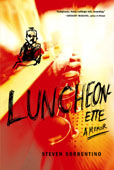- Categories:
Luncheonette -- Serving Up Real Life With a Side of Humor
 When Steven Sorrentino quit his job as vice president and executive director of publicity at HarperCollins to write his memoir, it was a remarkably bold move. Sorrentino hadn't written a book since sixth grade, when he penned Costume of Cellophane, a mystery novel inspired by The Hardy Boys. But despite feeling "terrified" as he sat down before a blank computer screen in May 2001, Sorrentino didn't waste any time. This February, Regan Books published Luncheonette, a darkly funny and affecting memoir about his experience taking over the family business in the face of his father's illness. The memoir has won praise from Kirkus and Publishers Weekly, and was recognized by independent booksellers as a March Book Sense Pick.
When Steven Sorrentino quit his job as vice president and executive director of publicity at HarperCollins to write his memoir, it was a remarkably bold move. Sorrentino hadn't written a book since sixth grade, when he penned Costume of Cellophane, a mystery novel inspired by The Hardy Boys. But despite feeling "terrified" as he sat down before a blank computer screen in May 2001, Sorrentino didn't waste any time. This February, Regan Books published Luncheonette, a darkly funny and affecting memoir about his experience taking over the family business in the face of his father's illness. The memoir has won praise from Kirkus and Publishers Weekly, and was recognized by independent booksellers as a March Book Sense Pick.
Luncheonette begins in 1980, when Sorrentino is 23, newly permed, and ready to sing and act his way onto Broadway and to take on the concomitant grind and excitement of New York as gay man fresh out of New Jersey and the closet, when he's forced back into both to care for his father, who is struck by a rare neurological disorder that leaves him paralyzed from the chest down.
 Photo by Jamie Hersteln |
Caring for his dad means assuming the helm of Clint's Corner, his father's luncheonette in West Long Branch, New Jersey. And this is where the reader is treated to scenes that are a bit like Alice, the hit 1970s sit-com set in a diner, peppered with Seinfeld sarcasm, but with writing richer and raunchier. Sorrentino limns a priceless and quirky raft of characters, in all senses of the word: There's Old Man Pascucci, who stuns the luncheonette into slack-jawed disgust when he cuts and flicks his corns onto the linoleum; the busloads of Syrian Jews who ask for bagels "with a shmeah"; Pepsi Man, who has "legs developed more than some countries"; and Dolores, the 60-something saucy waitress who reigns over Clint's Corner.
Sorrentino began working in public relations in 1987 at what was then Harper & Row, and spent his entire publishing career at HarperCollins through its various transformations. He handled the campaigns for many New York Times bestsellers including Oliver North's Under Fire, Margaret Thatcher's Downing Street Years and Path to Power, and John Gray's Men Are From Mars, Women Are From Venus. He recently spoke with Bookselling This Week from his home in Manhattan.
Back in the early '80s, Sorrentino knew he'd hit the storytelling jackpot. "It's funny, I always said that even when I was living through the luncheonette years, I always knew it was a book. I watched with a detached set of eyes taking it all in."
Sorrentino does a great job of taking in Dolores, whose "graveled" voice "made Tallulah Bankhead sound like a coloratura" and who, with her malapropisms and racy zingers, makes a perfect foil for Sorrentino. For instance, when Dolores tells him, "Sometimes I flunctuate," and he corrects her with a polite "Fluctuate...you said flunctuate," she snaps, "What are you a fuckin' grammararian?"
Remembering Dolores, Sorrentino said, "Even at the worst of times, she'd come out with these gems. You know the outrageous things she said in the book? She really did say every one of them. The minute she said them, I'd grab a kitchen check and write it all down."
Sorrentino was diligent about catching scraps of conversation, re-creating much of the dialog word-for-word, something that memoirists are often forced to fudge. He also captures accents and speech rhythms with perfect pitch. When asked if his background in music helped give him the ear for this, he said, "I've always been very musical, and I've always been very tuned into people's idiosyncrasies and inflections. I've been an actor and loved doing imitations and characterizations. I've never thought of that as part of my musicality, but maybe it is."
Luncheonette has its share of a Seinfeld-esque bite, but the book doesn't maintain Seinfeld's policy of "No hugging, No learning." Sorrentino deals with some psychologically weighty issues, including the loneliness of being a closeted gay man putting his career and life on hold, an experience that widens the book's audience rather than ghettoizes it into the province of gay men or the gay and lesbian section of a bookstore. "We learn so much from other people's truth, and I wanted to tell my story as truthfully as possible, so that it would be a place that other people could join me," he said.
"The experience of having to deal with the unexpected, having to deal with the uncertainties of life is a universal experience. There is plenty in the experience of a gay man for anyone to relate to. Everyone at some time or another has the experience of feeling isolated, feeling boxed in, feeling unexpressed, feeling trapped. I think these are all universal experiences. This experience just happened to happen to a gay man."
He also had to cope with the very serious illness of his father, Clint Sorrentino, which puts his life-lessons in perspective and moves Luncheonette into something of the memoir equivalent of a Bildungsroman. When Sorrentino is feeling pretty sorry for himself and missing Gotham, watching his father not only continually rally after each debilitating round of illness, but go on to run for mayor, provides an effective reality check.
But even through the heaviest moments, Sorrentino always keeps his gallows sense of humor. During a scene in Luncheonette when Clint almost chokes to death -- near fatalities don't stop the yuks -- Sorrentino finds a priest "pouring a cup of water down his [father's] throat ... from the sight and sound of things, we might just as well have stumbled upon an exorcism.... I went running to the nurses' station, shouting like a good little heathen: 'The goddamn priest just gave my father Communion!'"
Finding the humor during horrific moments was not a product of time passing, or his family's coping mechanism, said Sorrentino. "I'm embarrassed to say that even while it was happening I thought it was funny. Once the crisis itself passed, we thought it was the funniest thing that ever happened." Sorrentino seems to graciously accept all the highs and lows now, something the 20-year-old version might not have. "You know, life is not perfect," he said. "The comic and the tragic co-exist. It's there in everyday life. To this day, I'll go to a funeral or a wake for a loved one and can also see some of the humor in the histrionics.... It's funny. It's sad and it's funny and that's life."
Readers will wonder what happens after Sorrentino successfully flees the Garden State and will be happy to hear that he's currently working on his next memoir. "I haven't quite gotten it together yet, so I'm not talking about it very much... But it's based on another very important relationship in my life. That's all I'll say." --Karen Schechner
Sorrentino will be touring a minimum of seven cities for the "Words & Wine" tour, which is organized by Cindy Dach, events coordinator at Changing Hands Bookstore in Tempe, Arizona. The tour is a partnership between independent bookstores, publishers, and wine merchants to create literary events in support of newly published memoir authors. Three authors -- Amy Krouse Rosenthal (Encyclopedia of an Ordinary Life, Crown); Karen Spears Zacharias (Hero Mama, Morrow); and Sorrentino - -will travel to all of the designated tour cities. They will each read from or discuss their book, participate in a Q & A, and then sign copies of their books during the wine reception that follows. Varying from city to city, readings will be hosted in bookstores and eateries. Bookstores on the tour include Kansas City's Rainy Day Books in Kansas, Miami's Books & Books Cafe, San Francisco's Book Passages, Tempe's Changing Hands Bookstore in Arizona, and Denver's Tattered Cover.
For additional information regarding "Words & Wine," contact Dach at (480) 730-1142 or [email protected].

